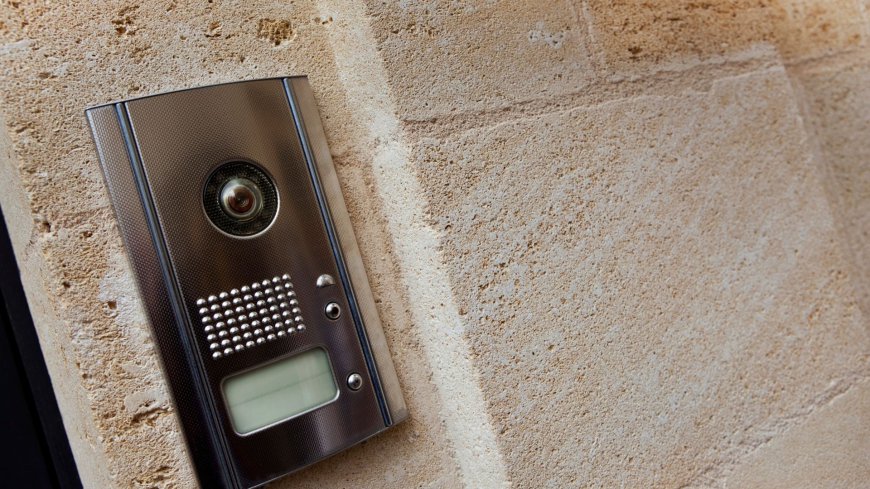What is the purpose of an Intercom system?
Discover the essential role of intercom systems in facilitating communication within buildings. Learn how intercoms enhance security, convenience, and efficiency for residential and commercial environments.

A direct, two-way communication channel that allows for direct interaction within a building or between multiple rooms is an intercom system, sometimes referred to as an intercommunication device. Many different types of surroundings, such as residential buildings, business enterprises, educational institutions, and healthcare facilities, use these systems extensively. An intercom system's functions include convenience, safety, security, and operational efficiency, in addition to basic communication.

Purpose and Benefits of Intercom Systems
1. Enhanced Communication:
The main purpose of installing intercom systems is to enhance communication within a particular space or building. These systems save time and effort by facilitating instantaneous and direct communication between rooms or different portions of a facility, hence eliminating the need for physical transportation. This is especially useful for massive structures or multi-story buildings.
2. Security and Safety:
The improvement of security is one of the main goals of intercom systems. Before giving admission, users can confirm a visitor's identity through intercoms, particularly ones that have integrated video capability. This is important because unauthorized access poses serious threats to residential buildings, offices, and schools. Since visual confirmation is possible with video intercoms, an extra degree of security is offered, especially in high-security settings.
3. Convenience and accessibility:
Intercom systems provide turnkey convenience, and people can effortlessly get in touch with other residents without having to move from their location. In homes or places with several rooms, the intercom system makes it possible for communication between the rooms to happen in a smooth manner, making them more accessible. It is more helpful in situations where passing a message is fast, like hospitals or emergency switchboards.
4. Operational Efficiency:
In the business world, especially on commercial and industrial premises, the intercom system is an essential communication tool. They ensure smooth interconnectivity between departments, resulting in efficient workflow and improvements to general organization standards. For example, in a factory, it can be used to relay instructions or any important information in the plant rapidly so as to facilitate rapid communication.
5. Integration with Other Systems:
A contemporary intercom may be connected with other security and automation systems, including an access system with codes, a video surveillance system, and an alarm. This integration helps in developing an integrated system of security, that harnesses both video surveillance and physical control. For instance, in a building with an intercom system installed and linked to a CCTV system, real-time monitoring and talking are crucial for security purposes when inspecting sensitive zones.
6. Emergency Communication:
In case of emergencies, intercom systems provide a reliable means of communication. They can be used to broadcast emergency announcements, guide people to safety, and coordinate emergency responses. This feature is particularly vital in large buildings, schools, and hospitals where quick and clear communication can save lives.
Types of Intercom Systems
1. Wired Intercom Systems:
Wired intercom systems involve physical wiring to connect intercom stations throughout the building. These systems are known for their reliability and consistent performance. They are ideal for permanent installations where the infrastructure supports extensive wiring.
2. Wireless Intercom Systems:
Wireless intercom systems use radio frequencies, or Wi-Fi to enable communication between units. These systems offer flexibility and are easier to install compared to wired systems. They are suitable for buildings where running wires are impractical or too costly.
3. Video Intercom Systems:
Video intercom systems combine audio communication with video capabilities, allowing users to see and speak with the person at the other end. These systems enhance security by providing visual verification, making them ideal for entry points in residential and commercial buildings.
4. Multi-Room Intercom Systems:
Multi-room intercom systems are designed to facilitate communication across multiple rooms or areas within a building. They are perfect for large homes, offices, and educational institutions, providing a convenient way to communicate with different parts of the building.
5. Smartphone-Based Intercom Systems:
With advancements in technology, intercom systems can now be integrated with smartphones. These systems use mobile applications to enable communication, allowing users to interact with their intercom system remotely. This is particularly useful for homeowners who want to monitor and control access to their property from anywhere.
Applications of Intercom Systems
1. Residential Buildings:
In residential settings, intercom systems are used to manage access to the property, communicate with family members in different rooms, and enhance overall security. Video intercoms at the entrance allow homeowners to see who is at the door before granting access, adding an extra layer of security.
2. Commercial Establishments:
In offices and commercial buildings, intercom systems facilitate communication between different departments, enhance security, and improve operational efficiency. They are used to manage visitor access, coordinate activities, and ensure smooth communication throughout the building.
3. Educational Institutions:
Schools and universities use intercom systems to communicate with staff and students, make announcements, and manage security. These systems ensure that important information can be quickly disseminated across the campus, enhancing safety and coordination.
4. Healthcare Facilities:
In hospitals and clinics, intercom systems play a crucial role in ensuring efficient communication between staff members, coordinating patient care, and managing emergencies. They are used to relay critical information, request assistance, and maintain smooth operations.
5. Industrial Settings:
Factories and warehouses use intercom systems to facilitate communication between different areas, enhance coordination, and ensure safety. These systems enable quick dissemination of instructions, emergency alerts, and operational updates, contributing to overall efficiency.
Choosing the Right Intercom System
Selecting the appropriate intercom system depends on several factors, including the specific needs of the building, the required features, and the budget. Here are some key considerations:
1. Purpose and Usage:
Understanding the primary purpose and usage of the intercom system is crucial. For example, a residential building might prioritize security and convenience, while a commercial establishment might focus on operational efficiency and integration with other systems.
2. Building Size and Layout:
The size and layout of the building will influence the type of intercom system required. Multi-room intercom systems are ideal for large buildings with multiple rooms, while wireless systems might be more suitable for smaller or temporary setups.
3. Features and Capabilities:
Different intercom systems offer various features, such as video capabilities, smartphone integration, and multi-room communication. It’s important to choose a system that provides the necessary features to meet the specific needs of the users.
4. Installation and Maintenance:
Consideration should be given to the installation process and maintenance requirements of the intercom system. Wired systems might require more extensive installation efforts, while wireless systems offer easier setup and flexibility. Additionally, ongoing maintenance and support should be factored into the decision.
5. Budget:
Budget constraints will also play a significant role in choosing the right intercom system. It’s important to balance the cost with the features and capabilities required to ensure the system meets the needs without exceeding the budget.
Conclusion
Intercom systems are indispensable means to provide effective communication correction, security, and work effectiveness for different spheres. Starting with residential properties, offices, schools, and hospitals to various business outlets, stores, and even restaurants and hotels, these systems form a reliable avenue of direct communication that comes in handy when it comes to safety and ease. As modern intercom systems are developed, we can find updated features that allow applications of today’s intercom system to provide a variety of communication solutions for people with different settings that include video capability, a smart phone interface, and a multi-room intercom.
Intercom systems have been important in helping users achieve better results in communication as well as the security functions of buildings, as the users will have fulfilled specific attributes and selected the right type of intercom system.
